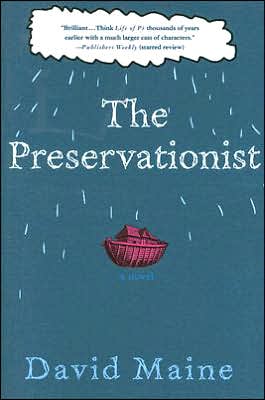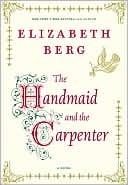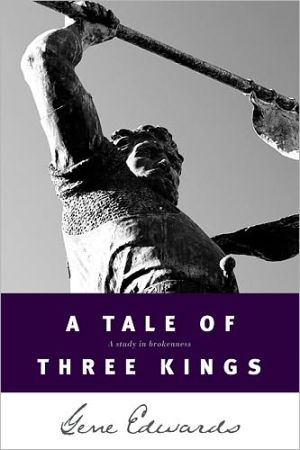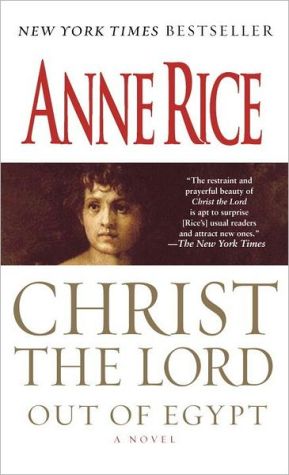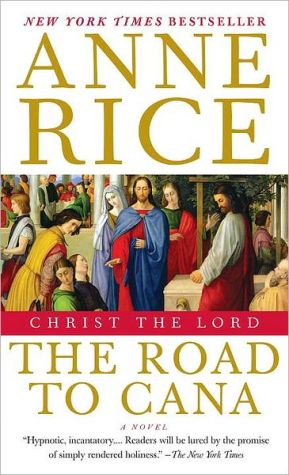Preservationist
"Noe says, -I must build a boat.\ -A boat, she says.\ -A ship, more like. I'll need the boys to help, he adds as an afterthought.\ -We're leagues from the sea, she says, or any river big enough to warrant a boat.\ This conversation is making Noe impatient. -I've no need to explain myself to you.\ -And when you're done, she says carefully, we'll be taking this ship to the sea somehow?\ As usual, Noe's impatience fades quickly. -We'll not be going to the sea. The sea will be coming to us."\ In...
Search in google:
Praise for Dave Maine and The Preservationist:"The Preservationist is funny, tender, intelligent, energetic, irreverent, and worshipful. It is an enormous juggling act of families, animals and faith, and it kept me engaged through every page. I imagine Noah would be enormously pleased with David Maine's novel, I know I was." - Ann Patchett, author of Bel Canto"I loved The Preservationist. It's a funny, convincing amplification of the Biblical story." - Tracy Chevalier, author of The Virgin Blue"Once they were strangers to us. Distant as specks. No more! Thanks to David Maine it is in the daily, the ordinary "Noah family" the "what's for breakfast?" the aching feet, the little insults or winks, the slap on the back, the gathering of insects in cupped hands that we know them now as we know ourselves, the family next door preparing to face the unknown, the "I am certain," the magnificent, the awful, the wonderful, the weird, the big. The Preservationist was great. Very moving and enjoyable and clever."- Carolyn Chute, author of The Beans of Egypt, Maine"Maine simply, wisely, asks himself what it was like to be there, "when the rain began to fall." For me, the strength of this book lies not so much in its entertaining characters as in the wonderful details of this old brand-new world.¿In just these details, small and large, Maine convinces us that the world Noah worked so hard to save is indeed worth preserving." - Jincy Willett, author of Winner of the National Book Award"If, like me, you've always wondered how Noah actually built his ark, and managed to fit all those animals on it, and survived forty days and forty nights of rain and flood, The Preservationist is the book for you. A funny, cheeky, irreverent, wonderfully original first novel, informed both by Biblical history and Dave Maine's joyous imagination." - Jim Fergus, author of One Thousand White Women"The Preservationist is delightfully wry and witty, throwing light on man's-and woman's-eternal folly in the name of God and of love. More, this retelling of an ancient tale is a great deal of fun to read, its characters etched with an acid affection that makes them unforgettable."- India Edghill, author of QueenmakerThe Washington Post - Melvin Jules BukietThrough the family's ordeal, Maine's eight characters in search of an acre begin to come to self-consciousness, concluding with the post-landing episode in which Noe's sons witness their father's drunken nakedness. As Adam and Eve once fell through guilt in the Garden, Noe's sons fall in the new Eden through shame. They have become the kind of people who ponder their salvation and their neighbors' drowning and ask, "Why me, and not them? Why them, and not me?" These are questions that couldn't be answered then and can't be now, and that's why they remain eternally valid.
C L O U D S\ 1. Noe\ But Noe found grace before the Lord.\ Genesis 6:8\ Noe glances toward the heavens, something he does a lot these days. Scanning for clouds. None visible amid the stars, so he finishes urinating, shakes himself dry and makes his way back to the house. Inside, the wife pokes desultorily at a pot of stew hanging over a fire. It is late for supper: the others have eaten already and retired to the sleeping room. Noe squats against one of the rough limewashed walls and points at a terracotta bowl. He's roughly six hundred years old: words are unnecessary.\ The stew is thick with lentils and goat. Noe slurps contentedly. A little salt would improve it, but salt is in short supply of late. Noe finishes the stew, sets the bowl aside, clears his throat. The wife recognizes this as a signal of forthcoming speech and offers her attention. Noe says, I must build a boat.\ --A boat, she says.\ --A ship, more like. I'll need the boys to help, he adds as an afterthought.\ The wife squats on the far side of the fire, paddle-like feet set wide apart, forearms poised on knees. She fiddles with the wooden ladle and says, You know nothing much of boats. Or ships either.\ --I know what I need, he says.\ --We're leagues from the sea, she says, or any river big enough to warrant a boat.\ This conversation is making Noe impatient. --I've no need to explain myself to you. She nods. The olive-oil lamp throws a soft yellow glow across them both. The wife is sturdily built, short and broad, and much younger than Noe: perhaps sixty. She was barely adolescent when wed to the old man, already white-bearded to his navel, with crow's-feet sunk into his temples like irrigation ditches. Still a vital old corker, though, and randy enough to rut her into three sons. Nowadays a stranger would have trouble guessing which of them was the senior.\ --And when you're done, she says carefully, we'll be taking this ship to the sea somehow?\ As usual, Noe's impatience fades quickly. --We'll not be going to the sea. The sea will be coming to us.\ She's banked the fire and taken the pot off already, but stirs it now out of habit. Her fingers are long and tapering. --It's one of your visions?\ --Yes, Noe says quietly.\ There is a pause.\ --So that's it then, she says.\ The wife looks up with a sad smile. For a moment she appears thirteen again, fourteen, and Noe glimpses the oval-faced girl half-hidden behind her brothers, eyes down, brought out to the front yard for his approval before he took her away on his mule. Something stirs in him then, simple and tender, and briefly he is regretful for all the anxiety he knows she will face. But it can't be helped. He has been called. More than that: he has been chosen, and there is something he must do.\ The wife says, I guess you'd better get started.\ --I guess I'd better, Noe agrees. But there is a small sad glitter in his wife's eyes, and he looks away while he speaks.\ This is what happened when Noe received the vision.\ He was in the mustard field, yellow flowers in all directions so bright they seared his corneas. Zephyrs ruffled them like silks on a line, like the surface of a pond. Dazzled by the shimmer, Noe strode through the patch, walking staff clutched in his gnarled right hand. His mind was busy with thoughts of trade, of what he could get from Dinar the peddler in exchange for a few hundredweight of mustard greens, of olives from his grove, of goat's milk and hen's eggs and sheep's wool. Some wine, perhaps, to fend off the midwinter dankness; or a few bolts of eastern cloth; or some salt, yes, definitely some salt. Doubtless the wife would have suggestions too, a copper pot, a better loom. Always there was something. Thank Yahweh he had no daughters to marry off and no dowries to accumulate.\ He heard the bleat of a lamb nearby. The sheep were supposed to be far to the east, on the hillsides with Japheth. Had one strayed?\ --Noe.\ The voice did not come from outside his head so much as inside. He staggered, but kept walking.\ --Noe.\ His hands were pressing against his forehead without his knowing it. --Who -- ?\ --Noe. He felt a physical pressure behind his temples, a gentle swelling against the inside of his skull. Though disconcerting, it felt in no way alarming. --I am here.\ --Yes Lord, he managed to stammer.\ --Noe, you are a good man. There are few such.\ Noe said nothing.\ --I am pleased with you and your sons. There are many I am not pleased with. Do you understand what I am saying?\ --Not exactly, my Lord.\ --The unbelievers shall be destroyed.\ Little more than a whisper: --Destroyed?\ --They shall be drowned in a flood of righteousness and brought before Me for judgement.\ Noe felt his bladder loosen, and hot urine streamed down his thigh. --As you wish, Lord. I pray that you will look with mercy upon my sons and myself, though we deserve it not.\ --Fear not, Noe. I have plans for you.\ Noe had long since stopped walking. Around him the hallucinatory vision of burning golden flowers filled his eyes with tears.\ --You are going to build a boat, Noe. Not just any boat. Something enormous, hundreds of cubits, big enough for you and your family and their families. Do you understand?\ --Yes, Lord.\ --When it is complete, you will collect every animal you can account for, male and female, as many as possible. Put them on this boat, and provision it well, because you know not how long you will be afloat. There will be a deluge.\ --I'll do as you instruct.\ --When the rain stops, you and your families and the animals you save shall go forth and fill the land again. All else shall perish.\ Noe nodded. It was either that or fall over. If he hadn't pissed himself already, he would do so now. --Lord, about this vessel.\ --Make it big, advised Yahweh.\ --A hundred cubits?\ --Three hundred. Fifty wide, and thirty tall. With three decks, and tar inside and out, and a pair of doors set into the side tall enough for three men.\ Despair chewed through him like a maggot. --My Lord, that is immense indeed. It will take time. And wood, he thought to himself, but didn't say aloud.\ Not that it mattered. --Time I will give. And timber others will bring you, if you but have faith enough. And then Yahweh, the Lord God of Noe's ancestor Adam and Adam's son Seth, evaporated from Noe's mind.\ --Lord?\ No answer. Noe's thoughts alone were present in Noe's head. He blinked. Tears tracked down his face and dry urine tugged stickily among the hairs on his calf. The sun toiled down relentlessly, reflected back by a thousand thousand tiny mustard blossoms. In their midst stood a dirty gray-white smudge: one of Noe's lambs, far astray and bleating furiously.\ Noe took this as a sign. He took many things as signs. He rushed the lamb, who stood riveted as if too startled to jump away. The old man scooped the animal and murmured, You're coming with me. You'll be the first.\ --Baa, answered the lamb.\ With purpose now, Noe made for the farm buildings, square whitewashed things like cubes of dirty chalk in the distance. His bony, bowed legs pumped vigorously, belying his great age. Noe knew that great age was not an obstacle to great deeds. Fatigue could be overcome; stiffness could be chased away. Forgetfulness could be managed or even turned to one's own advantage. Yahweh's words rattled in his ears as he hurried on.\ If you but have faith enough.
\ From Barnes & NobleThe Barnes & Noble Review from Discover Great New Writers\ The miraculous story of Noah's ark brings to mind a number of things: rain, animals, good and evil, God's wrath and His provision. But it's also a story of a family, an angle that novelist David Maine tackles in his original and absorbing take on the biblical tale. \ Faithful Noe, as he is referred to in Maine's work, receives visions from God. Most recently, God has instructed him to build a huge ship and fill it with breeding families of every beast in creation. "We're leagues from the sea," his wife protests. "Why so big?" his son Sem asks. "It's not a proper ship at all," complains another son, Cham. Frustrated, Noe continues to give orders, instructing two of his daughters-in-law to travel to the lands of their youth to gather pairs of exotic animals. "The problem with people who think that God will provide," grumbles one of them, "is that they think God will provide."\ Nimbly imbuing the Old Testament tale with his own sensibilities, Maine describes the family's undertaking: their quarrels over how to organize the animals, their worries over the boat, their encounters with the most ferocious beasts, and God's final command that they separate and repopulate the world. In The Preservationist, Maine's clever, thoughtful writing offers an imaginative new perspective on one of the Bible's best-loved stories. (Fall 2004 Selection)\ \ \ \ \ \ Janet MaslinThe Preservationist is poised somewhere in the gap between holy visions and practical details (like the hygienic upkeep of a floating "barnyard in a box"). It is an elegant, inventive book and in no way a cynical one, despite the author's keen appreciation of the incongruous. After having to answer questions about just how much timber he needs for this undertaking, Noe closes his eyes and thinks, "Things were much clearer when God was explaining." The book resounds with the gravity of Noe's mission even as it invents the quotidian details of his story. \ — The New York Times\ \ \ Melvin Jules BukietThrough the family's ordeal, Maine's eight characters in search of an acre begin to come to self-consciousness, concluding with the post-landing episode in which Noe's sons witness their father's drunken nakedness. As Adam and Eve once fell through guilt in the Garden, Noe's sons fall in the new Eden through shame. They have become the kind of people who ponder their salvation and their neighbors' drowning and ask, "Why me, and not them? Why them, and not me?" These are questions that couldn't be answered then and can't be now, and that's why they remain eternally valid. \ — The Washington Post\ \ \ \ \ Publishers WeeklyVisitations from God are a mixed blessing for Noah and his family in Maine's spirited, imaginative debut. Noah (aka "Noe") may have pissed himself upon hearing God's instructions to build an arc, but he sets to the task without delay. He crosses the desert to buy lumber from giants; his eldest, Sem, fetches Cham, the son with shipbuilding skills; Sem's wife, Bera, and Cham's wife, Ilya, gather the animals; and Japheth, Noe's youngest, helps, too, in between goofing off and "rutting" with wife Mirn. And, of course, there's "the wife," 600-year-old Noe's once-teenage bride, who takes everything "Himself" (that's Noe, not God) dishes out with time-tested practicality. Wildly different in temperament, age and provenance, these characters, each telling part of the story, help create a brilliant kaleidoscopic analysis of the situation: the neighbors who ridicule Noe and clan; the inner doubts and shifting alliances; the varying feelings toward God, whose presence is always felt and sometimes resented. The flood comes as a relief from the wondering ("who is crazier: the crazy man or the people who put their faith in him?"), but hardship soon follows. Though the ending is already written, Maine enlivens every step toward it with small surprises. A story of faith and survival (think Life of Pi thousands of years earlier with a much larger cast of characters), this debut is a winner. Agent, Scott Hoffman. (July) Copyright 2004 Reed Business Information.\ \ \ \ \ Library JournalMaine draws on the story of Noah and the flood for a powerful and engaging first novel. Closely following the biblical text (which runs only two pages in most editions), he brings great depth, realism, and psychological subtlety to Noah (or "Noe" as he is called here), his family, and their heroic struggle to survive the flood. Their world is a mysterious and forbidding one, full of ancient cities, exotic beasts, and sin and evil. In one city, for example, the men and women "rut" together in the street, and the dead are left piled up, unburied. Maine is most interested in exploring how Noah's family responds to their cataclysmic ordeal, and he describes the daily rigors and shifting emotions among family members effectively. He also explores issues of faith, doubt, and the nature of God with resourcefulness and courage. Highly recommended.-Patrick Sullivan, Manchester Community Coll., Manchester, CT Copyright 2004 Reed Business Information.\ \ \ \ \ Kirkus ReviewsNewcomer Maine cleverly retells the story of Noah and the Flood from the perspective of the great man's wife and children. According to the old saw, a martyr is someone who lives with a saint, and in the case of Noe, as he is styled in these pages, the truism holds up. The great patriarch may have single-handedly saved the human race, but the simple truth is that he was a royal pain in the neck. Noe's wife tells it best. She was just 13 when she married the old coot, who was then on the far side of 500, and she learned the hard way what it takes to satisfy a sexacentarian in bed. Withdrawn and largely silent, Noe seems to have more converse with God than he does with his family, and they are long since used to receiving outlandish pronouncements from him out of the blue. But even Noe's wife has to bite her tongue when he tells her that he has been commanded to build an ark and prepare for a deluge that will destroy the world. The boys are somewhat less nonplussed: Cham has been trained as a shipbuilder and takes the order in stride; Sem and Japheth dutifully put their shoulders to the wheel and start building once the wood miraculously arrives. The daughters-in-law, sent off to gather in all the different species so as to march them two by two up the gangplank, are rather more put out, but that is the way of in-laws. Eventually, Noe's folly is completed, and damned if the old boy wasn't right. It starts to pour cats and dogs until the thing floats right away, and the rains don't stop for 150 days. His family members owe their lives to the old man's uprightness-but that doesn't make him any easier to put up with, especially aboard ship. Neither satire nor hagiography, but an idiomaticmodern rendering of the biblical tale in accord both with contemporary sensibilities and historical accounts. Book-of-the-Month Club alternate selection. Agent: Scott Hoffman/PMA Literary and Film Management\ \
